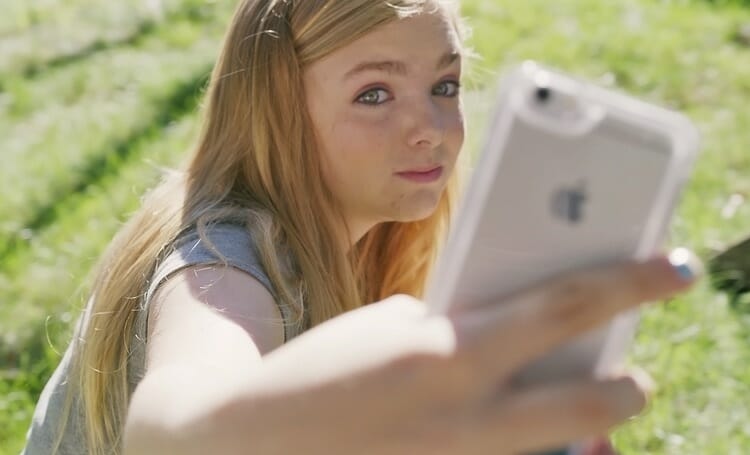At an Awkward Age, Finding Grace
So real it comes off as a documentary, “Eighth Grade” is worth the trip—for both its heroine and for audiences. Think adolescence was tough? Imagine going through it with a cellphone. ("Eighth Grade" still image courtesy of A24)
Think adolescence was tough? Imagine going through it with a cellphone. ("Eighth Grade" still image courtesy of A24)
An extraordinary movie about an ordinary girl named Kayla, “Eighth Grade” follows her through a final week of middle school. The film, like its heroine, is equal parts cringeworthy and inspirational.
Kayla has the misfortune of being a 13-year-old in an era when teenagers live their lives online, one in which how you look matters and who you are does not. But she has the fortune of being deeply, unconditionally loved by her father (Josh Hamilton), even though they are rarely on the same wavelength.
So vividly played by Elsie Fisher that more than once I had to remind myself that “Eighth Grade” is not a documentary, Kayla is not unattractive. But she is majorly awkward, shuffling down corridors, her blue eyes glued to leaden feet as if the universe judges her as wanting. Actually, Kayla is more ignored than she is judged.
At school, her distinction is to be voted “Most Quiet.” At home she makes chatty, affirmational videos on subjects such as “Be Yourself.” And in one of the film’s affectionate contradictions, the next morning she gets up, slathers on makeup, arranges her hair, and returns to bed to take a just-woke-up-like-this selfie.
In his directorial debut, filmmaker Bo Burnham, himself a onetime YouTube phenom, comes not to bury the internet and e-communications but to understand them as social tools that can be used for ill as well as to connect the disconnected. At best, social media can help lost souls like Kayla find their tribe, or at least text to potential tribe members.
While there is a lot of social anxiety in “Eighth Grade,” for the most part it is a low-key film that invites the audience to empathize with and embrace Kayla and her apprehensive father. And much of it affirms writer John Ciardi’s observation that “[y]ou don’t have to suffer to be a poet. Adolescence is enough suffering for anyone.”
Spoiler alert: The film is as much a cautionary tale for parents as it is a portrait of a supercharged transition moment for teens.
To my surprise, the film made me look differently at phenomena I opposed as a parent of teenagers. It persuaded me that the cellphone is not necessarily a crutch, but a kind of night light for adolescents. That time spent on YouTube videos—such as Kayla’s about projecting confidence—is not just a way of avoiding homework, but also a way to think out new ideas and rehearse for real-life encounters.
As I watched “Eighth Grade,” not only did I relive my adolescence, but those of both my daughters. What made it all worth it was Kayla’s supreme resilience and optimism. She never catastrophizes, nor does she take the dirt road into Negativetown. In the belief that the arc of teenage life bends toward gladness, she soldiers on and finds that belief justified. At an awkward age, Kayla finds a kind of grace.
But for its R rating (for a fusillade of the F-word, the mention of “blow job” and for the fact that teenagers differentiate themselves by not seeing films their parents invite them to), I would recommend “Eighth Grade” for parents and their teens. Because middle-schoolers can’t see the film without an adult, go with them—but don’t sit near them.
Your support matters…
Independent journalism is under threat and overshadowed by heavily funded mainstream media.
You can help level the playing field. Become a member.
Your tax-deductible contribution keeps us digging beneath the headlines to give you thought-provoking, investigative reporting and analysis that unearths what's really happening- without compromise.
Give today to support our courageous, independent journalists.






You need to be a supporter to comment.
There are currently no responses to this article.
Be the first to respond.